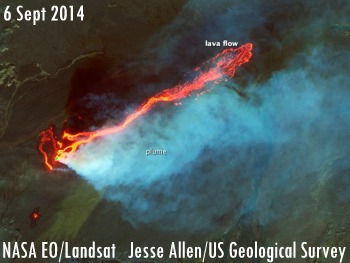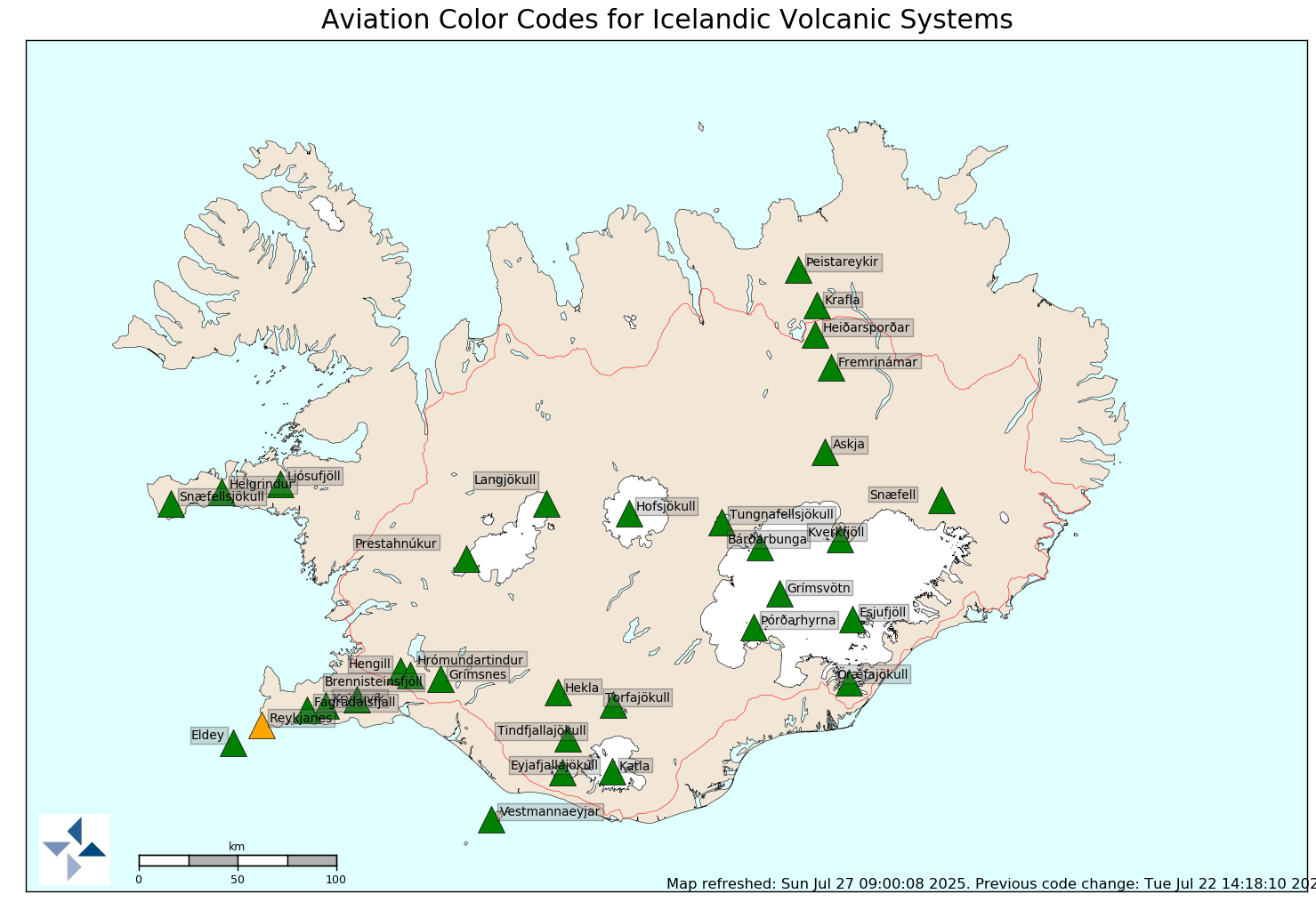 |
|
|
|
IMAGES:
Spectacular Lava Illumination in Iceland |
|
|
|
Holuhraun Fissure
Eruption, Iceland 16 Oct 2014 [800x600] |
|
One of the most amazing things that I have
ever seen! From 150 miles away, 75 miles out into the Atlantic Ocean, I
noticed the distant glow on the clouds from a lava eruption on Iceland
[wiki].
Even though I was aware of its current status it still managed to
surprise me. Apparently it had already reached the status of being the
largest eruption there for
100 years,
but remains mostly unknown because of its remoteness and current
insignificants to anyone else. Trust me, if this was anywhere else in
the world near a significant population, it would be the number one
nightly news story everywhere on the planet, day after day! The
reddish-orange glow got significantly brighter as I got closer to a
minimum distance of 75 miles. For the first time I was seeing a new
source of light: Astronomical (sun, moon, stars, aurora), Natural:
(lightning, forest fires), Man-made illuminations: (city lights,
beacons, gas fires), and now... Lava! The other pilot said it looked a
bit like "Lord or the Rings" a dramatic reference to the
fictional "Centre Earth"
volcano [wiki] and frankly, with an astonished loss of words I agreed. I simply
was unprepared to imagine such an eruption that was beyond my
comprehension to a scale that had no familiarity. It was truly something
new. These 16 Oct 2014 twilight images allow some land features to be seen. |
 |
|
Above:
NASA Earth Observatory Landsat image of Holuhraun Lava Fissure processed
by Jesse Allen of the US Geological Survey.
[NASA-6Sept2014]
[NASA-16Sept2014]
[NASA-31Aug2014] |
|
|
|
Holuhraun
Fissure Eruption, Iceland 16 Oct 2014 [800x600] |
|
Iceland has had many eruptions in the
recent past and significant eruptions in modern historical times from
several different volcanoes. My very own Great Great Grandparents left Iceland
to avoid hardships associated with eruptions in the 1800's. This current
lava eruption is coming from a remote area called the
Holuhraun
[wiki]
area, however the lava is not coming from the top of a volcanic
mountain, but instead from a giant crack on the ground called the Holuhraun Fissure
. It is just north of Iceland's largest glacier, the
Vatnajokull
Glacier [wiki] on the
south-east of Iceland. Underneath this giant Icecap are several
volcanoes which occasionally erupt. Most people heard about the
Grimsvotn Volcano
[wiki]
and its
copy-cat eruption and Ash Cloud which interfered with
Trans-Atlantic airline flights in May 2011[wiki]
[dailymail]. This current eruption is associated with a different
volcano, the
Bardarbunga Volcano
[wiki]
which is also underneath the same giant Icecap. Scientist are able to
measure that the Bardarbunga Volcano's Caldera has dropper about 100
feet, which clearly indicates continuing activity underneath the ground. As of the
end of October, after two months of continuous eruption, a cubic
kilometer of lava has poured out of the fissure with no end in sight. As
long as the lava eruption continues to occur in the fissure, away from
the giant glacier, then a disruptive ash cloud may be averted.
Another volcano, 80 miles to the southwest, is the infamous
Eyjafjallajokull Volcano
[wiki]
which erupted with an Ash Cloud that significantly closed European
airspace and Trans-Atlantic airline flights for 6 days in April 2010
[wiki-2010]. Eruptions of Eyjafjallajokull are occasionally linked
to the
Katla Volcano
[wiki]
which is overdue for a large eruption which could also affect air travel
in the future.
The nature of these volcanoes means that
it is very safe to fly in their proximity when authorized. Iceland monitors the region
very meticulously and responds immediately to any changes. The current
eruption, as of October 2014, has no high altitude ash associated with it
but is releasing low level poisonous gases
[forecasts-gas] which cause risk to people
nearby on the ground. Consequently, because of its remote location in
Iceland, most Icelanders have not seen this impressive eruption in
person. I asked
the Reykjavik Air Traffic Controller if he had managed to see the
eruption and he informed "no" that the entire area is off-limits to
everyone except scientists and journalists.
BBC. Iceland Bardarbunga Alert (Aug 31):
[29003031]
Interesting photo from low-level
Iceland flight:
[telegraph]
Latest Iceland Bardarbunga Volcano
chat:
[VolcanoDiscovery.com]
Latest Iceland Volcano Blog:
[Jonfr.com]
Latest Iceland Bardarbunga Volcano Met
News:
[vedur.is]
Latest Iceland Aviation Warnings:
[en.vedur.is]
NASA Earth Observatory Photos:
[31Aug2014] [6Sept2014]
[16Sept2014]
|
 |
|
Above:
Current Live Iceland Met active volcano status.
[Iceland-Met] |
|
|
|
|
|
Holuhraun
Fissure Eruption SO2 Aerosols, Iceland 6 Sept 2014 [800x600] |
|
Lower level Sulphur Dioxide SO2
[wiki]
related aerosols downwind from Iceland's volcanic eruption creates an
exaggerated red reflection off the North Atlantic Ocean as seen from
37,000 feet on 6 Sept 2014. Photo was featured on SpaceWeather.com
[archive] |
|
|
|
|
|
Holuhraun
Fissure Eruption Plume, Iceland 4 Sept 2014 [800x600] |
|
Above is a high altitude steam plume over the
Holuhraun
Fissure Eruption. It is not a typical
volcanic plume of ash but rather a convective cloud of steam and SO2
gasses. Coincidently, large summer forest fires are also able to create similar convective plumes
simply from their own heat which can occasionally precipitate rain like a thunderstorm.
Canon
60D.
(N64.90, W016.75
map).
4 Sept - 16 Oct 2014.
Photo: (c)
2014 Brian Whittaker (.com) . See fair use policy. |
|
|

































































